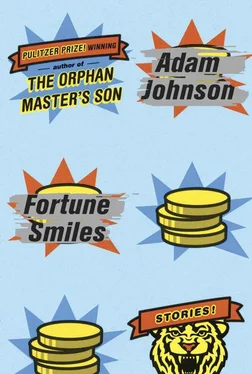“Never what?”
“That there’s never another woman.”
“Why are you talking like this?” he asks. “You haven’t talked like this in a long time.”
“You could just go without,” I say. “You know, just soldier on.”
“I really feel bad for what’s going through your head,” he said.
Interesting fact: Charles Manson used to live in our neighborhood at 636 Cole Street.
Manson’s house looms ahead. I always stop and give it my attention. It’s beige now, but long ago, when Manson used this place to recruit his murderous young girls, it was painted blue. I used this house as a location in my last novel, a book no one would publish. Where did all those years of writing go? Where does that book even reside? I gaze at the Manson house. I feel alive right now, though looking through the gauze of curtains into darkened inner rooms, I can’t be sure. In researching my novel, I came across crime-scene photos of Sharon Tate, the most famous Manson stabbing victim. Her breasts are heavy and round, milk-laden since she is pregnant, with nipples that are wide and dark.
I look up at my husband. He is big and tall, built like a football player. Not the svelte receivers they put on booster calendars. But the clunky linebackers whose bellies hang below their jerseys.
“I need to know,” I said. “Just tell me how long you’d wait?”
He puts his hand on my shoulder and holds my gaze. It is impossible to look away.
“You’re not going anywhere,” he says. “I won’t let you leave without us. We do everything together, so if someone has to go, we go together. Our 777 will lose cabin pressure. Better yet, we’ll be in the minivan when it happens. We’re headed to Pacifica, hugging the turns on Devil’s Slide, and then we go through the guardrail, all of us, you, me, the kids, the dog, even. There’s no time for fear. There’s no dwelling. We careen. We barrel down. We rocket toward the jagged shore.” He squeezed my shoulder hard, almost too hard. “That’s how it happens, understand? When it comes, it’s all of us. We go together.”
Something inside me melts. This kind of talk, it’s what I live on.
—
My husband and kids came with me to the hospital for the first chemo dose. Was that a year ago? Three? What is time to you — a plucking harp string, the fucking do-re-mi of tuning forks? There are twelve IV bays, and our little one doesn’t like any of the interesting facts on the chemo ward. This is the day she stops speaking and turns into Horse-child, galloping around the nursing station, expressing her desires with taps of her hooves. Our son recognized a boy from his middle school. I recognized him, too, from the talent show assembly. The boy had performed an old-timey joke routine, complete with some soft-shoe. Those days were gone. Here he was with his mother, a hagged-out and battered woman beneath her own IV tree. She must have been deep into her treatments, but even I could tell she wasn’t going to make it. I didn’t talk to her. Who would greet a dead woman, who would make small talk with death itself? I didn’t let my eyes drift to her, even as our identical bags of Taxotere dripped angry into our veins.
That’s how people would later treat me; it’s exactly the way I’m treated today when I come home to find my husband sitting on the couch with Megumi, a mom from the girls’ grade school. My husband and Megumi are talking in the fog-dampened bay-window light. On the coffee table is chicken katsu in a Pyrex dish. Megumi wears a top that’s trampoline-tight. She has a hand on my husband’s shoulder. Even though she’s a mother of two, her breasts are positively teenybopper. They pop. Her tits do everything but chew bubble gum and make Hello Kitty hearts.
“Just what’s going on here?” I ask them.
They brazenly, brazenly ignore me.
I got to know Megumi on playground benches, where we struck up conversations while watching our daughters swing. I loved her Shinjuku style, and she loved all things American vintage. We bonded over Tokidoki and Patsy Cline.
“I love your dress” is the first thing she said to me.
It was a rose-patterned myrtle with a halter neck.
“Interesting fact,” I told her. “I’m from Florida, and Florida is ground zero for vintage wardrobe. Rich women retire there from New York and New Jersey. They bring along a lifetime of fabulous dresses, and then they die.”
“This is something I like,” she said in that slightly formal way she spoke. “No one in Tokyo would wear a dead woman’s dress.” Then she apologized, worried that she might have accidentally insulted me. “I have been saying the strangest things since moving to America,” she admitted.
Our family was actually headed to Tokyo for the launch of my husband’s book in Japanese. Over the weeks, Megumi used sticks in the sandbox to teach me kanji that would help me navigate the Narita airport, the Shinkansen and Marunouchi subway lines. She asked about my husband and his book. “Writers are quite revered in Japan,” she told me.
“I’m a writer, too,” I said.
She turned from the kanji to regard me anew.
“But no one will publish my books,” I added.
Perhaps because of this admission, she later confided something in me. It was a cold and foggy afternoon. We were watching a father push his daughter high on a swing, admiring how he savored her delighted squeals in that weightless moment at the top of the arc.
“If my life was a novel,” Megumi suddenly said, “I would have to leave my husband. This is a rule in literature, isn’t it? That you must act on your heart. My husband is distant and unemotional,” she declared. “I didn’t know that until I came here. America has taught me this.”
I was supposed to reassure her. I was supposed to remind her that her husband was logging long hours and that things would get better.
Instead, I asked, “But what about your kids?”
Megumi said nothing.
And now here I find her, sitting on my couch, hand on my husband’s shoulder!
I’m the one who introduced them. Can you believe that? I’m the one who got her a copy of his novel in Japanese. I watch Megumi open her large dark eyes to take him in. And I know when my husband gives someone his full attention.
I can’t make out what they are saying, but they are discussing more than fiction, I can tell you that.
Something else catches my eye — arrows. There are quivers of arrows everywhere — red feathers, yellow feathers, white.
In the kitchen is a casserole dish wrapped in aluminum foil. No, two casserole dishes.
I discover a hospital band on my wrist. Have I left it on as a badge of honor? Or a darkly ironic accessory? Is the bracelet some kind of message to myself?
Interesting fact: The kanji for irrational, I learned, is a combination of the elements woman and death .
—
There was an episode not long ago that must be placed in the waking-and-sleeping-reversed column. I was in the hospital. Nothing unusual there. The beautiful thing was the presence of my family — they were all around me as we stood beside some patient’s bed. The room was filled with Starbucks cups, and there were my brother, my sisters and my parents, and so on, all of us chatting away like old times. The topic was war stories. My great-uncle talked about playing football in the dunes of North Africa after a tank battle with Rommel. My father told a sad story about trying to deliver a Vietcong baby near Cu Chi.
Then my brother looked stricken. He said, “I think it’s happening.”
We all turned toward the bed, and that’s when I saw the dying woman. There was a wheeze as her breathing slowed. She seemed to get lighter before our eyes. I’ll admit I bore a resemblance to her. But only a little — that woman was all emaciated and droop-eyed and bald.
Читать дальше












